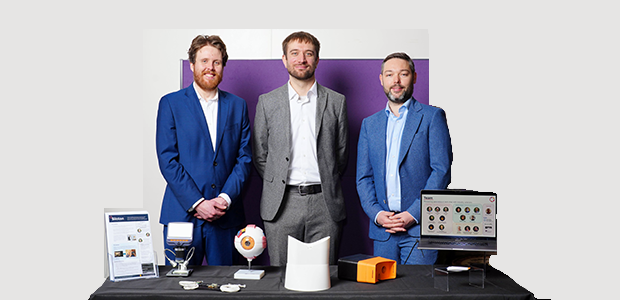
Siloton secures funding as first product launch approaches
Siloton, the Bristol-based health technology startup, has secured £860,000 to progress the commercial roll-out of its eye imaging chip technology, which could help address the UK’s most common cause of sight loss.
The funding package will help Siloton to further develop its Akepa optical coherence tomography (OCT) chip technology and bring a version of the device for researchers to market in 2025. Later this year, the company is aiming to deliver a world first by capturing the first chip-based OCT image of a living eye in a commercial setting – a key milestone for its future use by clinicians.
Evenlode Impact Investments committed further capital in the latest round alongside members of the South East Angels, the Francis Crick Institute, and other experienced angel investors. They were complemented by non-dilutive funding from an Innovate UK Biomedical Catalyst grant, taking total funding in the company to date to £1.7 million.
Siloton’s technology aims to make the diagnosis and monitoring of a range of treatable retinal diseases more affordable and accessible, by compressing a tabletop-worth of heavy, expensive, and fragile components onto a single chip smaller than a £1 coin. The technology could save the NHS more than £1 billion annually and allow patients to monitor their condition at home, rather than having to regularly attend hospitals.
Conditions such as wet age-related macular degeneration (AMD), retinal vein occlusion, and diabetic macular oedema affect millions of people worldwide, putting them at risk of blindness. In the UK, AMD is the largest cause of sight loss, according to the Macular Society, with around 39,800 people developing wet AMD each year.
Dr. Alasdair Price, CEO of Siloton, said: “Siloton has brought together a uniquely qualified team that is able to drive forward technology development at an unprecedented pace. This new support will help us take the next step towards commercialisation by shifting gear from R&D to product development.
“The population of individuals with retinal disease is growing. New, more affordable and accessible OCT systems like our Akepa technology will be critical to serving patients with precision and efficiency. In turn, this could help reduce preventable blindness, save healthcare providers billions of pounds, and reduce pressure on already stretched eye clinics.
“We are on the cusp of a significant milestone with our technology and look forward to sharing this in the not-too-distant future.”

